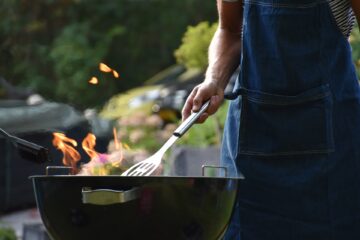The temperature of sausage is the most important factor to tell if your sausages are cooked through or not. Flavorful and juicy, sausages are always one of the most favorite dishes of all time. However, cooking sausages can be quite tricky, especially when you don’t have a thermometer available in your kitchen pantry. Let’s find out how to check the doneness of sausages in the article below.
What happens if you eat raw or undercooked sausages?
According to the USDA’s Food Safety and Inspection Service, pathogenic bacteria can be found in raw or undercooked sausages. These bacteria can lead to different diseases, such as tuberculosis, food poisoning, meningitis…
WHO estimates that every year, foodborne illness affects 600 million people around the world; of them, 420 thousands die. Unsafe food also leads to about 48 million cases of foodborne diseases in America, causing 3.000 deaths, says The Centers for Disease Control and Prevention (CDC).
Food in general, and sausages in particular, is only safe to eat when cooked to a specific internal temperature.
Check the temperature of sausage using a meat thermometer.
Cooking meat to a required internal temperature is the main priority that every cook needs to pay attention to. To check the doneness of your sausages, the most accurate and easiest method is using an instant-read meat thermometer. Here is the step by step guide on how to measure temperature with a meat thermometer:
Step 1: Pierce the tip of the thermometer into one end of the sausage (about 1/2 inches deep). It’s the opening that was twisted into links on the side of the sausage. Never insert the thermometer into the sausages’ casings, or else the meat will be dry due to loss of juices.
Step 2: Wait about 2 to 3 seconds until the thermometer registers the exact temperature.
Step 3: If the internal temperature of the sausages reaches 165-degrees F for poultry or 160-degrees F for lamb, pork or beef. Then you know the meat is already finished cooking and ready to serve.

See also: 6 Ways to Know If the Chicken is Cooked Without a Thermometer
Check temperature of sausage without a meat thermometer.
If you don’t have a meat thermometer handy, there’s also another way to tell the doneness of the sausages. Here’s how you should do it:
Step 1: Cook until all sides of the sausages turn golden brown.
Step 2: Pick one of them and make a crosswise cut. Where to cut depends on what the sausages will be used for when they’re done cooking.
If you just want to quickly brown the sausages for a stew. Then choose one end of the sausage and cut a quarter-sized piece from it. Suppose you plan to make sausage sandwiches, then cut one of them in half because you’ll end up doing this in the end when putting the sausages between the hot dog buns.
Step 3: You can tell a fully cooked sausage by the taupe-colored meat, clear juices and firmness. On the other hand, if the sausage is still pink inside, with bloody juices and soft meat, then they’re definitely undercooked. This technique is used for pan-fried, oven-baked or grilled sausages.

Minimum internal temperature of sausage according to USDA
| Type of sausage | Minimum internal temperature | Resting time |
| Wild fowl sausage | 73.8°C / 165°F | 3 mins |
| Turkey sausage | 73.8°C / 165°F | 3 mins |
| Game sausage | 73.8°C / 165°F | 3 mins |
| Chicken sausage | 73.8°C / 165°F | 3 mins |
| Pork and beef sausage | 71.1°C / 160°F | 3 mins |
| Pork sausage | 71.1°C / 160°F | 3 mins |
| Beef sausage | 71.1°C / 160°F | 3 mins |
These are the minimum internal temperatures specified for each type of sausage, according to USDA. After your meat thermometer inserted into the sausages registers the above temperatures, let the sausages rest for about 3 minutes. This way, the meat will continue cooking and tenderizing itself while sealing in the flavorful juices.
See also: Kylie Jenner’s shrimp taco recipe: How to make them
Tips for the cooking temperature of sausage
Your sausages burnt outside but undercooked inside. If you’re dealing with the same problem, it’s because the sausages are cooked over way too high heat. To fix the situation, you can only remove the scorched bits and throw the remaining sausages in a stew or soup dish. However, you can always avoid this problem by cooking the sausage on low heat. Try to pan fry them on medium heat before baking them in a 350-degree oven. This way, you don’t even have to check the temperature of the sausage.

There are still conflicting opinions of cutting up or pierce the sausages before cooking. Some people say that it’s necessary to cut up or pierce the sausages so that the steam can escape, avoiding burst casings. Others say that by cutting up or pricking the sausages, you also let the juices, moisture and fats escape from the meat. This way, the sausages will become dry and chewy. According to the experienced cooks, it’s best that you choose to cook the sausages over low heat. In doing so, you will prevent the skin from being burst. And at the same time, you can maintain the juiciness of the sausages.
The easiest and safest way to cook sausages is to poach them first before cooking them on a skillet or a hot grill.
Hopefully, cooking sausages will not be that big of a challenge after you’ve read through the whole article about the temperature of sausage. If you follow Bourbon O’s advice, please share your end results with us and many home cooks out there!





Hello, the whole thing is going nicely here and ofcourse every one is sharing information, that’sreally good, keep up writing.
Thanks so much for the blog.Much thanks again. Want more.